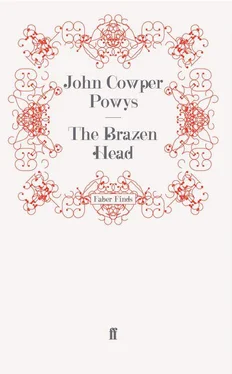While we are still struggling, enduring, enjoying, as we move or rest in the earth, air, or water, of our terraqueous globe, there will always be this atmospheric aura about us where the psychic reactions engendered by the attractions and repulsions, the devourings and escapings, that go on in life mount up and remain, drifting and floating here and there in a curious chaotic mixture of the pleasant and the unpleasant.
And it is because of this atmospheric arena always about us, whether indoors or out-of-doors, whether on the surface of plains or mountains, whether in earth-mines or undersea-caverns, whether in any level of the air, or above any fiery crater or tumultuous sea, that those among us — and Sir Mort obviously included himself in this select category — who are alive to these rarefied visitations, are frequently exhilarated or saddened without any apparent inward or outward cause.
These sudden variations of mood without apparent cause are — Sir Mort would explain, though he assumed that his wife knew nothing of such subtle emotions — extremely puzzling phenomena. But they can, he would point out, be made less mysterious if we think of this atmospheric dimension of psychic reactions as composed not only of the sensations of all living things from the cleverest human beings and the most intelligent animals, birds, fishes and reptiles, to the most simple-minded tadpoles, jelly-fish, star-fish, earth-worms, and insects, together with the vast mass of all the vegetable growth in the world, but of such sensations as they occur in the strain and stress of cosmogonic chance.
It was all in a second curiously enough, as this tidal memory of her husband’s ten-thousand times repeated harangue swept over her, that she actually found herself wondering whether there might not really be a grain of truth in all this craziness. Dimension or no dimension, there must be a reason for this ebbing and flowing of our feelings, and for our being sometimes so mysteriously happy, and sometimes so unutterably sad.
“Well,” she thought, “I can’t stand here staring at little Popinjay all night! I must get rid of the boy somehow.” And as she raised her hands to feel whether her hair was in proper order, she became half conscious of that alder-leaf on the floor between herself, the self-questioning Lady Val, and her visitor, the quiescent and self-approving Sir William.
“She,” Sir William was thinking, “must be suffering a lot. Poor, poor woman! She must know, after all I’ve said, that she has given her daughter to the wrong man! So I really must be kind to her in her unhappiness.”
But what the unhappy lady was thinking was this: “I’ll tell Ulanda what we all feel about Baron Boncor’s beard, for I think that will trouble her arrogant mind more than anything else.”
And what, we might wonder, was that alder-leaf’s parent-tree thinking in its nakedness as it bowed before the wind? Was it thinking, “If only I could stretch a quarter of an inch nearer the water I would tell this blind, stupid, silly, deaf, dumb, idiotic stream in what direction it ought to flow if it wants to reach the sea.”
And if no thought of that leaf on the floor crossed the furthest fringe of its parent-tree’s cogitations, you may be sure that neither Sir William nor Lady Val gave the slightest attention to its fate; and there it would have lain for the rest of that evening and the whole of that night had not old Mother Guggery been sent from the kitchen to ask some important semi-culinary, semi-social question of the Lady of the Manor.
Mother Guggery always used a massive ebony stick when she walked, though physically she had not the least need of such support, and she showed now by the way she came stumping up between the young knight and Lady Val that the moment her curiosity was satisfied as to what they were talking about, or being silent about, she would turn her back upon the young man and concentrate on her mission to the lady.
But in a household as turbulent with new starts and old upshots, with new conspiracies and old frustrations, as was this Fortress of Roque, it was impossible, especially at the close of a sunny day at this time of the year, and upon such a central and crucial debating-ground as this particular spot, for any discussion to be long confined to its originators.
Thus before Mother Guggery had got down to the business of her message, who must come drifting in but Lady Val’s younger son, the intellectual young John, who was often called “John of London” at the Priory, because of his frequent visits to the King’s court on behalf of Friar Bacon. He now came loitering and drifting towards his mother with the air of one who had been using his wits all day long to such exhaustive effect among the high problems of metaphysic and theology that he has earned the right, now that the day is over and darkness is falling, to forget these high matters — yes! to forget this difficult super-world with its niceties of the human conscience, its nuances of Trinitarian Personalities, and its dissolving facets of unfathomable Absolutes, and to give himself up to any frivolity that drifted across his path in that domestic portico between kitchen and dining-hall.
Nor does life often fail us under such conditions; for there is Something in life that is at once different from Chance and yet not quite identical with all that we mean by the word Fate; and it is this Something that almost always provides us with some spontaneous motive when we are, so to speak, angling for an urge to pursue any available flibbertigibbet.
And thus it now happened with the younger son of Sir Mort Abyssum. Mother Guggery, having assumed by her lady’s look that more was in the air than she could cope with just then, came bolt out with the message from the kitchen, and, as she turned to go, her eyes fell on that last year’s alder-leaf lying on the floor. With the end of her ebony stick the old woman endeavoured, by obstinately poking at it, to get the leaf near enough to her feet to be able to stoop and pick it up. This whole picture, the ebony stick, the thin bent back, the patient motionless leaf, was enough, when taken in at a glance, to cause young John to rush forward and snatch up the leaf himself.
And then, all in a second, an airy connection struck him between this whole small event and the teaching of Friar Bacon, who had always instructed him to save such vegetable waifs from bonfires, and to cast them, loose and free, as near their birthplace as possible. So into the young man’s most intimate pocket went this lucky leaf to be disposed of later.
It was more than a surprise to the simpler dwellers in that portion of Wessex dominated by the traditional Manors of Roque and of Cone, and perpetually being interfered with by the unprecedented and incalculable domain of Lost Towers, when the holy, the thrice-blessed, the miraculously learned representative of the Holy Father himself in Rome, Bonaventura, the most famous of all Franciscans since Saint Francis, began, in that early spring of the year of grace 1272, searching the district for heretics and unbelievers, and using as his band of retainers nothing less than a regular cohort of brown-vested bandits from the swamps of Lost Towers.
And this singular heresy-hunt, led by a reputed saint commanding a body-guard of reputed devils, was an incredible event even to the good-natured Baron of Cone himself, whom it disturbed not a little. He finally made up his mind to accept it at its face-value; but since his youth, when serving under King Henry at the battle of Lewes, he had beheld the triumph of Simon de Montfort, he had never had such a spiritual shock.
When in the course of chronicling these events we seek to understand this shock, we are driven to conclude that it came from a certain inherent simplicity in Baron Boncor’s nature, which instinctively accepted without question all those natural assumptions about good and evil, which like the biblical “charity” are only too apt to “cover a multitude of sins.”
Читать дальше











